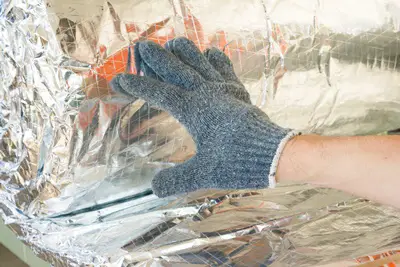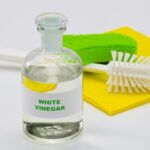Rats target kitchens, especially leftover food that’s on open counters. You may think a layer of aluminum foil (thin sheet metal) should be sufficient to keep rats out. However, a determined rat can chew through various metals, including canned food made from tin and steel.
Although rats dislike the texture, aluminum foil won’t keep rats out. Aluminum is 2.5 on the Mohs hardness scale, while rats’ teeth are 5.5. Their teeth are harder than aluminum, so they can rip, gnaw, and tear aluminum. Rats chew on abrasive surfaces to wear down their ever-growing teeth.
Aluminum’s reflective qualities, flashes of light, smell, taste, and crinkling noises will initially startle rats. However, because rats are clever rodents, they’ll soon overcome this fear and realize that the foil is harmless. Rats may dislike aluminum foil, but this won’t deter them.
Can Rats Chew Through Aluminum Foil?
Aluminum foil is a thin sheet of pliable metal, so the average rat will have no problem gnawing through it.
Rats can chew through aluminum foil easily because they have a strong bite force and sharp, hard teeth. They can grind through various materials, including thin sheet metal.
Let’s explore how this happens in more depth:
Strong Bite Force
To appreciate the chewing efficacy of rats, it’s worth considering the anatomy of their mouth.
The muscles that control a rat’s jaws are anchored around the eye sockets. This is unlike humans, where they’re anchored just below the ears.
This gives rats’ jaws more leverage of movement, thus allowing them to grind through most materials.
Ever-Growing, Sharp Teeth
Rats have monophyodont teeth. According to Comparative Anatomy and Histology, rodents only grow one set of teeth during their lifetime.
They don’t have baby teeth, and they’ll never lose old teeth to regrow new ones. Instead, their single set of teeth will grow continuously throughout their lifetime.
Rats spend their days biting, gnawing, and chewing on whatever they please. Even if teeth chip or break, they’ll eventually grow out again. A break in the tooth will be sanded down, revitalizing the rat’s teeth.
Rats must sand their teeth on hard objects to keep them at a manageable length. If they don’t, this can result in discomfort, injuries, starvation, or mortality. According to Animal Laboratory Science, dental overgrowth usually causes death through malnutrition.
This means that rats will be willing to chew on metal out of curiosity and a need to maintain their dental health. Chewing on hard substances allows rats to sharpen their teeth further.
Dense Teeth
Rats’ teeth rank higher on the Mohs scale than human enamel.
According to International Biodeterioration & Biodegradation, the Mohs scale measures how hard or soft a broad range of minerals are, depending on how well they cut (or break) against each other. Whereas human teeth have a 5.0 ranking on the Mohs scale, rats’ teeth are ranked at 5.5.
Aluminum is only 2.5 to 2.9, depending on its composition and thickness. Based on this scale, aluminum foil will be easy for rats to bite through.
Rats’ teeth won’t even be chipped or heavily sanded down, so they’ll be able to gnaw through several layers of aluminum foil when given time and sufficient motivation (food, shelter, warmth, etc.)

Do Rats Like Aluminum Foil?
Rats can chew through aluminum foil, but they dislike the material. They’ve been observed to act cautiously if presented with silver, shiny foil for the following reasons:
Reflective
Aluminum foil has a shiny, reflective surface that rats find confusing and scary.
It’ll catch light easily and from many angles, surprising a rat. As a rat approaches, its image may cast shapes, colors, and movements across the foil, which will be startling. A rat may think it’s near a predator as the foil moves whenever the rat moves.
Given time, rats are smart enough to figure things out. They don’t recognize the foil as reflective since they don’t pass the mirror test. However, they soon realize that no harm comes their way.
Bright
Rats have excellent night vision because they’re nocturnal, spending most of their time exploring in the dark. To offset this, they have poor eyesight when exposed to bright light.
This makes them sensitive to abrupt flashes. Any subtle light in your kitchen or dining room reflecting off the foil may cast the light directly into a rat’s eyes.
This stresses the eyes, causing the rat to keep a safe distance. Once it learns to ignore this or approach aluminum foil from a different angle, it’ll be unafraid, especially if it contains food.
Loud
If the light and reflection don’t bother the rat, the aluminum foil’s noise will.
Rats have good hearing, so the crinkly sound that the aluminum sheets make when touched will initially scare rats. The noise can be high-pitched, sudden, and loud.
Usually, when a rat first makes contact with aluminum foil, it’s startled by the unfamiliar sound, causing it to retreat. Later, it’ll return, attracted by the smell of food, and nibble at it again.
As the rat starts getting used to the sound of aluminum foil, it’ll realize that it poses no threat and stop fleeing. At this point, it is likely to chew through it, especially if there’s food hidden inside.
Does Aluminum Foil Deter Rats?
Even though rats will leave aluminum foil alone at first, it won’t deter them indefinitely. Most rats will overcome their aversion to aluminum foil and start chewing through it to reach what they want.
It’s helpful to put aluminum foil around your home, yard, or near food to scare off small rodent pests. The foil frightens mice, so they keep their distance.
Unfortunately, this won’t work with rats. Leaving food wrapped in aluminum foil in the open will unlikely deter rats from eating through the thin sheet metal wrapping and accessing the food within.
Ensure food wrapped in aluminum foil is kept where rats can’t easily access it, such as in a fridge.
Will Rats Eat Aluminum Foil?
Rats don’t want to eat aluminum foil, as they know better than to eat non-digestible items.
Consuming non-food items can upset rats’ stomachs, lead to impaction, and take up stomach space. Instead, rats chew on anything they can and avoid swallowing.
A rat may accidentally swallow some aluminum foil. While munching on the sheets covering your food, a small piece may slide down its throat. Usually, this won’t be sharp enough to cause internal damage, and if it’s small, the rat will pass the foil without digesting it.
It’s rare for rodents to eat enough of any non-food item to die from it. Their “eat anything” strategy is more of an “eat anything edible and chew everything else” habit.
Rats chew on abrasive substances to shave down their constantly growing teeth.
What Can Rats Not Chew Through?
Rats can chew through almost anything, including most metals and some types of concrete, such as cinder blocks. However, many materials are resistant to a rat’s powerful bite.
If you want something more durable to store your food in, the following materials will keep rats out:
- Stone.
- Glass.
- Thick metal.
You should avoid plastics, anything related to paper, and thin metals like tin, copper, and some types of steel. Unfortunately, rats will not be kept out with aluminum foil.







